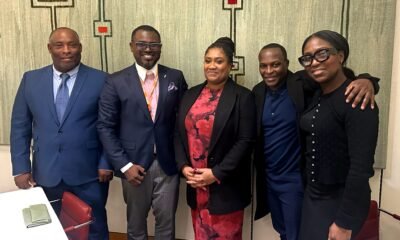Editorial
Accra-Tema train shuttle okay but…
Dear Editor,
Few months ago, I wrote to commend the management of the Ghana Railways Company Limited (GRCL) following resumption of the Accra-Tema passenger train service.
Feedback from some members of the public indicates the service has been beneficial to commuters since it got back on track on Monday, July 18, 2022. Some people say the shuttle is relatively cheaper compared with the cost of travelling on commercial buses.
I am, however, concerned about the somewhat limited number of trips the train embarks on daily basis in spite of the seemingly increased patronage of the service.
Living close to a train station in my area, I notice the train arrives early morning around 6am to pick passengers and again drops them off around 6:30 pm. I believe the shuttle is fixed around these times as it is considered the rush hour for workers, traders and other business people.
Nonetheless, there could be a mid-morning or afternoon shuttle for people whose jobs do not require them to leave home very early, in addition to a shuttle after 6 pm which would also help workers returning very late to their places of residence.
While I stand to be corrected, I have noticed that the single train operating currently looks different from the modern one we were told had been procured some time ago. If the new trains are still not in use, it is time they were deployed to augment the existing ones.
I must say I am impressed with the effort of the GRCL to improve and revamp the rail transportation system in the country but I believe the concerns identified here can be addressed in the interim while the company works towards expanding operations to other parts of the country.
James Kwame Wilson,
Sakumono, Greater Accra Region.
Editorial
Decentralisation of student loan scheme way to go

Dear Editor,
It is often said that education is the key to success.
Although there are divided opinions due to various reasons, one can not undermine its importance towards the growth of any country, including Ghana.
Over the years, successive governments have implemented various policies to ensure that every child gets access to quality education at all levels by bearing some of the cost.
We can talk of the Free SHS policy and also the free tertiary education for first year students by the current government.
Also, one way the government supports tertiary students financially is through the student loan scheme where tertiary students apply for loans to support themselves financially and pay when they start working.
It is fair to say that the student loan scheme has been of immense benefit to students who apply and are lucky to have it.
That notwithstanding, a few of my friends I have interacted with have also shared their frustration about the whole application process.
According to them, some students have had to abandon the idea of applying for the loan due to the frustration they encounter while going through the whole application process.
Although I never applied for the loan during my days as a university student, I shared in their pain and frustration.
Tertiary institutions are uniquely positioned to identify ‘needy but brilliant students’ more effectively than any other state institution, and for this reason I am of the view that the student loan scheme should be decentralised, with universities managing the process through a well-constituted board.
Also, the board should be clothed with the responsibility of approving loan requests based on applicants’ demonstrated academic performance and proven financial need.
Such a localised approach, I believe, would make the funds available to the most deserving students promptly and efficiently and also address the bottlenecks associated with the whole loan application process.
Atom,
Sukura
Editorial
Clubs must be proactive to prevent violence at home grounds
Dear Editor,
The recent disturbances during a Ghana Premier League match between Nsoatreman FC and Kumasi Asante Kotoko on Sunday, February 2 in Nsoatre in the Bono region, which tragically resulted in the death of a dedicated supporter of Kotoko, have revealed the deep security issues affecting the growth of Ghana football.
The incident reveals the increasing lawlessness and violent behaviour of some football fans during and after games, the lack of proper security measures in place, and the failure to address violence in Ghanaian football.
Football is meant to unite, inspire, and entertain, not to claim lives. The loss of Francis Yaw Frimpong, aka Nana Pooley, is something that should never have happened, and justice must be served.
The Ghana Police Service has taken bold and expected steps by arresting suspects, but this should only be the beginning of a huge effort in eradicating football-related violence across the country.
Also, clubs should be held accountable for their actions and ensure proper measures to keep their venues security-ready and safe.
Strict punishments must be meted to people who involve themselves in football-related violence. Those found guilty of inciting or participating in hooliganism should face lifetime bans from venues with heavy fines and criminal prosecution.
To act as a deterrent, clubs whose supporters commit violent crimes should also be subject to severe sanctions, such as fines and point deductions. Additionally, campaigns for education and awareness must be planned in order to inform supporters who act ignorantly due to emotion and a lack of knowledge about the repercussions.
Finally, in order to stop additional harm, everyone should have access to better compensation and support for referees and players. Dissatisfaction with refereeing calls or unfavourable match conditions are the primary causes of violent events. Some of these conflicts can be avoided by making sure referees are properly protected, rewarded, and trained. Players, too, need to feel safe when stepping onto the pitch, knowing that their careers and lives are not at risk.
This tragic incident should serve as a wake-up call for all football lovers and demand concrete actions to be taken to prevent more violence and the possible collapse of our domestic league and damage to Ghana’s football reputation. The GFA, clubs, security agencies, and fans must come together to fight this cancer, which is almost taking over our game.
Enoch Ntiamoah,
Nkawkaw







